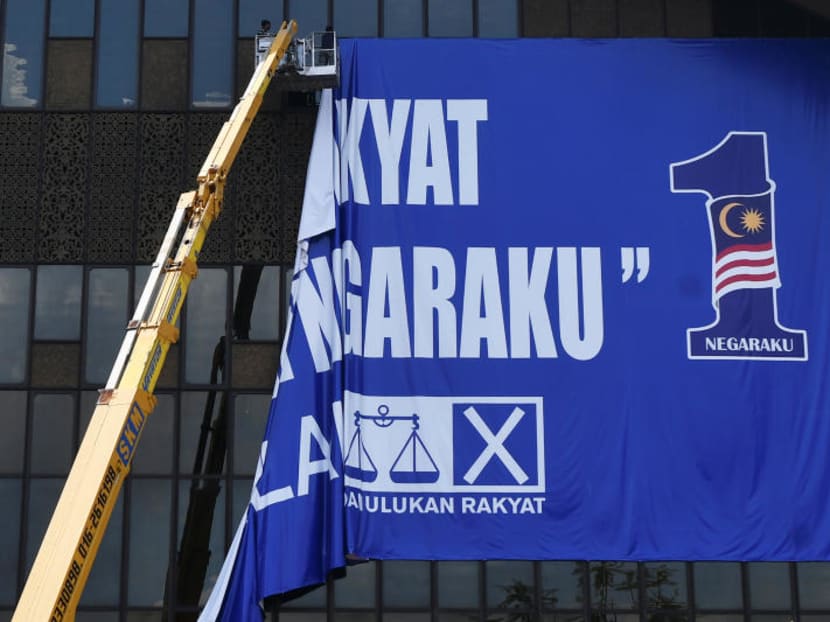BN’s soul-searching must include fast-track leadership renewal
Malaysians have decided, and they have opted for the 92-year old Tun Dr Mahathir Mohamed to lead the country once again. Already a record holder for being the country’s longest serving Prime Minister (22 years, from 1981 to 2003) — something future Malaysian prime ministers may not be able to match if their terms in office are restricted to two — Dr Mahathir has scored another achievement for being the oldest prime minister in the world.

A worker tears down a Barisan Nasional flag at Putra World Trade Centre (PWTC) in Kuala Lumpur, Malaysia on May 10, 2018.
Malaysians have decided, and they have opted for the 92-year old Tun Dr Mahathir Mohamed to lead the country once again.
Already a record holder for being the country’s longest serving Prime Minister (22 years, from 1981 to 2003) — something future Malaysian prime ministers may not be able to match if their terms in office are restricted to two — Dr Mahathir has scored another achievement for being the oldest prime minister in the world.
He now has the people’s mandate to steer the country towards economic recovery, and save it from a mounting debt problem inherited from the previous government.
He certainly has the experience to revive the country, having in the past guided Malaysia out of the 1997-1998 Asian financial crisis.
While all eyes are on what Dr Mahathir is going to do in the upcoming months, the future of the opposition Barisan Nasional (BN) coalition remains in doubt.
The coalition had held power since the country’s independence in 1957, via its model of consociationalism — which ensured multi-ethnic representation through the alliance of the Malay-based United Malays National Organisation (Umno), Chinese-based Malaysian Chinese Association (MCA), and Indian-based Malaysian Indian Congress (MIC).
Along with other small parties and indigenous ones in Sabah and Sarawak, this blend kept the country stable.
Malaysians now have to adjust to a new government. What does this first defeat mean for BN?
Even though it lost power at the federal level, all is not lost, though there may be changes to its leadership.
The position of Umno president, who is automatically BN chairman, may see a contest. Umno will also have to rethink its relationship with the MCA and MIC, which saw its presidents defeated.
While the Malay party also suffered huge defeats and lost key ministers and senior leaders, its top leaders won: Najib Razak, Ahmad Zahid Hamidi, Hishamuddin Hussein, Tengku Adnan Mansor and Khairy Jamaluddin all retained their parliamentary seats.
BN also had a consolation prize - it managed to hold at least three states: Pahang and Perlis and Sarawak. The bigger question now is who will be the opposition leader in the federal parliament. Datuk Seri Najib, the former PM, has stepped down as Umno President and Chairman of BN, and Datuk Seri Ahmad Zahid will be party’s Acting President. During the 11-day campaign period, the opposition Pakatan Harapan coalition trained their fire on Datuk Seri Najib and his family. And the pressure from within Umno to dump the former premier, who has been tarnished by the 1MDB scandal - a key reason voters broke the faith with BN- may have forced Datuk Seri Najib to step down.
In order to recover, BN has to learn from its mistakes, reconnect with the electorate, and also study PH’s success.
PH was once in a position similar to that which BN finds itself now: It controlled some states, and did well in governing them.
In Penang and Selangor, for instance, the Democratic Action Party (DAP) and Parti Keadilan Rakyat (PKR) introduced several good initiatives that secured their positions in the states, despite concerted attempts by BN to dislodge them.
PKR, for instance, introduced the Inisiatif Peduli Rakyat (IPR) in Selangor, which offers help to residents of that state in areas such as education, childcare, healthcare and public transport, among others. BN has to ensure that similar schemes that help residents of the states it leads are implemented.
More importantly, BN should embark on leadership renewal. It relied too much on incumbent parliamentarians and senior leaders in the last election.
While the strategy paid off in some cases — 81-year-old Tengku Razaleigh Hamzah, for example, successfully defended his Kelantan seat — it has denied younger candidates the chance to prove themselves.
For PH, apart from veterans Dr Mahathir, DAP’s Lim Kit Siang (DAP), Wan Azizah Wan Ismail from PKR and Muhyiddin Yassin of the Parti Pribumi Bersatu Malaysia (PBBM), the young candidates who won their seats this time forged their political skills during the last few elections.
PH fielded 25-year old Syed Saddiq in Johor, and PKR endorsed 22-year-old law student P. Prabakaran in Selangor. Both won.
While BN has not totally ignored leadership renewal, it needs to do more.
Umno and BN could opt for a younger leader, such as Mr Khairy Jamaluddin, who is in touch with youths and millennial voters.
As demonstrated in GE 14, young voters are no longer focused solely on race when it comes to politics.
They want to be heard, and their concerns mirror that of modern and middle class societies. Young candidates should work on the ground now if they want to be considered in the next elections, due by 2023.
ABOUT THE AUTHOR:
Dr Norshahril Saat is Fellow at the ISEAS-Yusof Ishak Institute. He researches on Malaysia, Indonesia and Singapore politics and society.









